Scammer Urban Legends: Chapter 6
Scammers Are All Alike?
A SCARS Insight
Scammer Urban Legend: All Scammers Are Nigerian
Most victims and the public, in general, have a mistaken idea that all scammers are from one region.
It seems like every day, all you hear about are Nigerian 419 and fake military scams, and that all of these scammers must be Nigerian.
Nothing Could Be Farther From The Truth
However, Nigerians and other West Africans do make up the bulk of online or Internet-based fraud. According to the analysis by the Society of Citizens Against Relationship Scams Inc. [SCARS], Nigerians outnumber all other online scamming regions combined by approximately 2 to 1.
What many overlook is that there are scammers in other regions too, and in each region, their behaviors and methods are quite different.
THE AFRICAN SCAMMERS
The Nigerians are famous for their email money scams and for their fake military soldier forms of romance scams, though they have perfected hundreds of variations over the last 20 years especially. The last decade has been a boom for all of the African-style scammers with a huge explosion in the numbers of Nigerian scammers operating in very large corporate groups. They will employ teams to work a victim because they have the luxury of manpower, and have had a more process-oriented approach to scamming online.
In the rest of Africa, especially West Africa – with Ghana being the leading center (outside from Nigeria) the method is similar but has a slight difference. Ghana scams rely on more individual scammers, though they work in gangs that allow them to bring in a co-scammer on demand – especially a woman (frequently their girlfriend or wife). Ghana scams focus greatly on scamming men, using models and porn star stolen identities. They have their pitch down to a science on these. Of course, all of the Africans use all forms and approaches depending upon where they were trained. Individual scammers rarely vary from the style or pitch they feel most comfortable with.
INDIAN SCAMMERS
The Indians have grown at an amazing pace. Today most phone scams come out of Indian, Pakistan, Bangladesh, and Sri Lanka. However, the Indians are expanding into places like Vietnam and even into Latin America. Indians focus on identity-based scams and straight one-time frauds mostly, such as IRS scams, jail & bail scams, grandparent scams, etc. Their goals are typically to get money quickly or to get your identity.
EASTERN EUROPE & RUSSIA SCAMMERS
The Russians, Ukrainians, and Eastern Europeans focus on scamming men looking for a bride. They employ dedicated dating websites that use real women (though their identities can be fake) that can be contacted and dated both online and on real visits. However, the reality is that while the man may have actually met the girl for real it is all about getting as much money as possible. Because the men tend to visit these regions there is a real risk of violence as well.
FILIPINAS & SOUTHEAST ASIANS SCAMMERS
In the case of the Philippines (and to a lesser extent other SouthEast Asian countries) these tend to be real people who are economically disadvantaged who will play a Westerner for everything they can get. You will find real women connecting with Western men and developing long-term online relationships that never come to a satisfactory conclusion because the women have either boyfriends or husbands already, and their sole purpose was to have the victim support them for as long as possible. Throughout the scam, they will tell the absolute truth about themselves and their situation, except for their relationship status and how they feel about the victim. You will find a smaller number of these also in Vietnam, Thailand, and Malaysia (though Malaysia is usually run by Nigerians in their country). One thing is important to remember in the case of these, if you go there to visit them there is a real risk of violence and kidnapping.
LATIN AMERICAN SCAMMERS
Latin America has its share of romance scammers as well. They have been involved for at least 15 years, and follow similar techniques to the Philippines. Real people, usually real names, just with no intention to form a real relationship. There are exceptions to this, and those are mostly marriage fraud – where they WILL marry and come to your country then divorce as soon as they get their residency – typically to the U.S. or Europe. Like with the Philippines, this is mostly disorganized individuals doing it on their own and driven by poverty. However, there are now larger groups forming in Brazil and beginning to copy the Nigerian model.
DOMESTIC NORTH AMERICAN & EUROPEAN SCAMMERS
Let us never forget that there are domestic scammers as well. People in Europe and North America also engage in romance scams, though the number is low, it is climbing. Here we find two primary types of scammers.
- The regular deception scammers (liars) – basically people to lie about themselves or who they are to try to create a relationship. These do not often involve money, but the impact on a victim can be just as severe. In a recent study, it was found that more than half of dating profiles contain at least one significant falsehood.
- The true romance scammer looking for money. These can be more dangerous in that these are people you can meet and talk to in person. Fundamentally they are Con Artists of old but now use the Internet as their primary recruiting method. Con Artists have always run romantic scams – for hundreds of years, but fortunately to be able to perform the scam in person requires a skill set that is in short supply. Though their numbers have been growing, especially with the migration of Africans to Europe and North America – professionally trained scammers have brought their skills with them and are working it near you.
In order to avoid being scammed a whole new set of survival and defensive skills are needed. You need to not only understand how to recognize the typical African-style scammer but also those from other regions. If you understand that scammers can be fake or real, and come from any region, you will be better able to be on guard.
REMEMBER TO REPORT THEM, BLOCK THEM, AND NEVER RESPOND TO SCAMMER MESSAGES THAT MANAGE TO GET THROUGH!
TAGS: SCARS, Information About Scams, Anti-Scam, Scams, Scammers, Fraudsters, Cybercrime, Crybercriminals, Romance Scams, Scam Victims, Online Fraud, Online Crime Is Real Crime, Scam Avoidance, Married Scam Victims, Internet Infidelity, Scam Victim Divorce
PLEASE SHARE OUR ARTICLES WITH YOUR FRIENDS & FAMILY
HELP OTHERS STAY SAFE ONLINE – YOUR KNOWLEDGE CAN MAKE THE DIFFERENCE!
THE NEXT VICTIM MIGHT BE YOUR OWN FAMILY MEMBER OR BEST FRIEND!
By the SCARS™ Editorial Team
Society of Citizens Against Relationship Scams Inc.
A Worldwide Crime Victims Assistance & Crime Prevention Nonprofit Organization Headquartered In Miami Florida USA & Monterrey NL Mexico, with Partners In More Than 60 Countries
To Learn More, Volunteer, or Donate Visit: www.AgainstScams.org
Contact Us: Contact@AgainstScams.org







what are their names? i have been scammed from people in accra. private email me
[WE DO NOT ALLOW PRIVATE COMMUNICATIONS THROUGH COMMENTS FOR YOUR SAFETY]
DID YOU REPORT THEM ON OUR REPORT FORMS? IF SO THEY WERE DISTRIBUTED THROUGHOUT OUR NETWORK. LAW ENFORCEMENT AROUND THE WORLD WAS NOTIFIED AND THEY WILL BE PLACED ON WATCH LISTS (ASSUMING YOU HAD REAL IDENTITIES). DO YOU HAVE ANY IDEA HOW MANY SCAMMERS ARE OPERATING? OVER 100,000 WITH OVER 400 MILLION FAKE IDENTITIES. WE HAVE HAD A HUGE IMPACT, BUT NOT EVERY SCAMMER IS GOING TO BE ARRESTED IT IS JUST NOT POSSIBLE.
I have been scams 3 years ago. I was report to FBI. Doesn’t seem help me much. Like you said. Scammers a lot anywhere. You can’t get them. Anytime I thinhking about that. I’m so sick . they still try to scams me more. I wish they in jail for good their life..
YOU ARE NOT PAYING ATTENTION. WE BUILT A WORLDWIDE SCAM DATA NETWORK CONNECTING LAW ENFORCEMENT, GOVERNMENTS, WEBSITES, SOCIAL MEDIA AND MORE. IT IS NOT MUCH USE IF YOU DO NOT USE IT! EVENTUALLY, SCAMMERS LEAVE THEIR COUNTRIES WITH THEIR MONEY AND CROSS BORDERS. THE REPORTS ADD SCAMMERS TO INTERNATIONAL WATCH LISTS SO THEY CAN BE ARRESTED WHEN THEY LEAVE THEIR SAFE HAVENS
Yes i have been the victem of scamming from a lady from ghana west africa.Her name is grace antwi nash.Her gmail is sweet and lovely
What did she look like ? Did she ever reveal herself in video chat ?